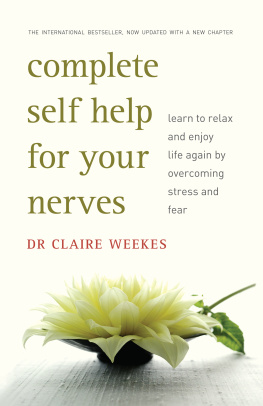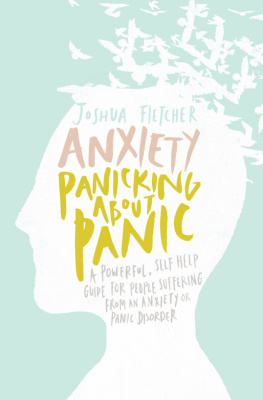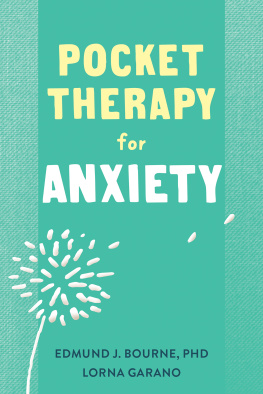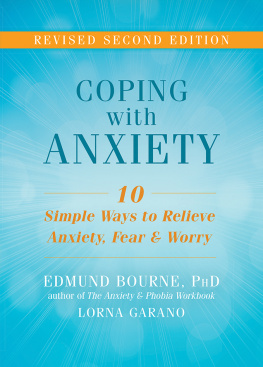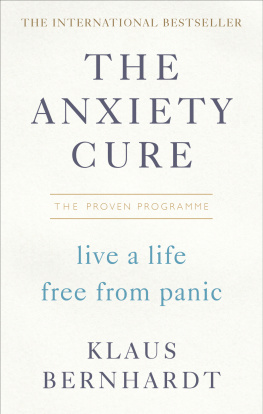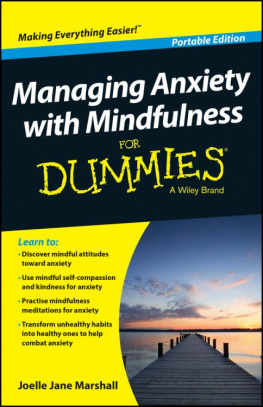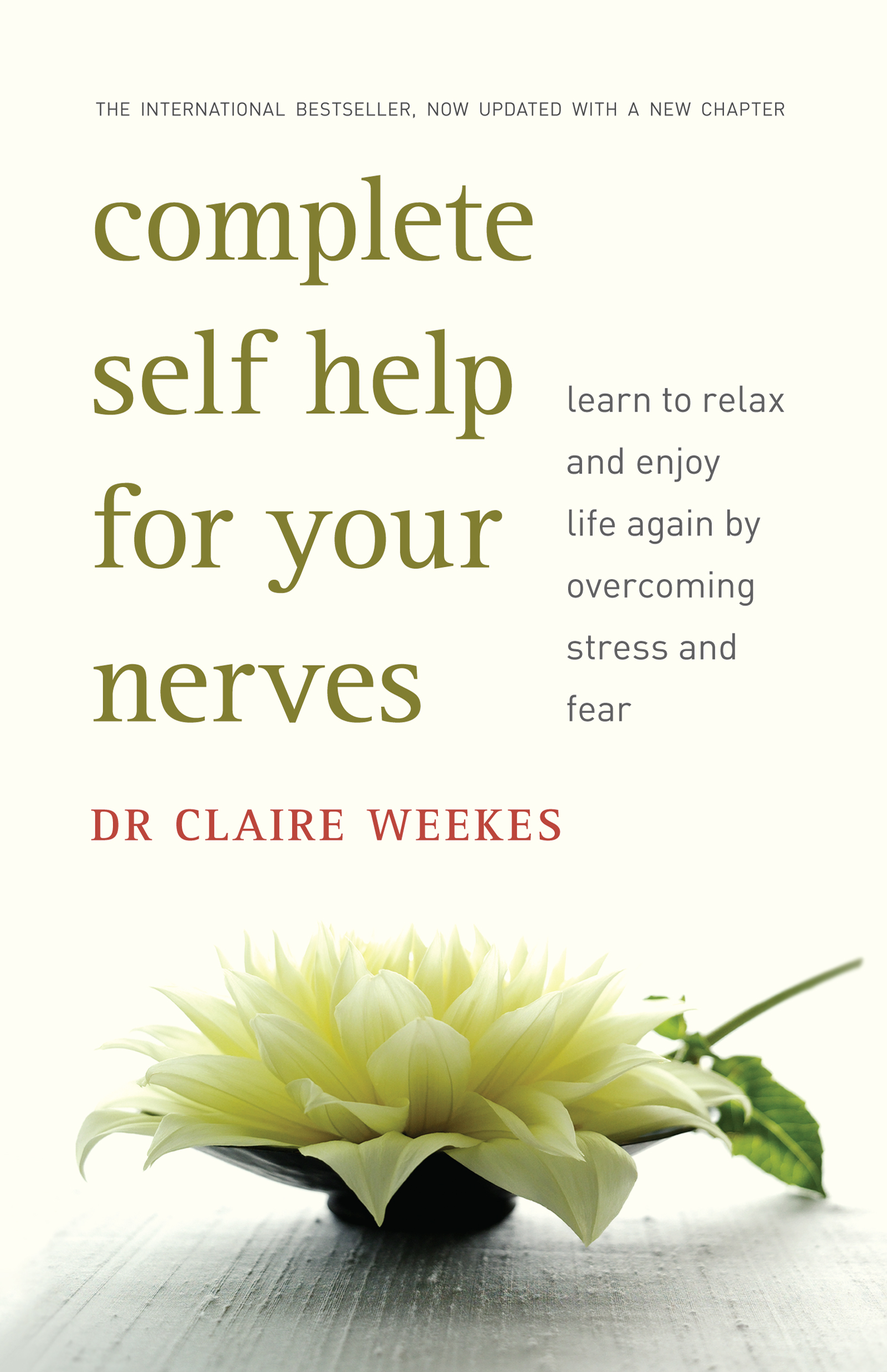Contents
Guide
Dedicated with esteem to the many
whose courage has helped to make
this book
The book is intended as a general guide only. Everyone is different and you should always consult a qualified professional about your individual circumstances.
Contents
If you are reading this book because you are having a nervous breakdown or because your nerves are in a bad way, you are the very person for whom it has been written and I shall therefore talk directly to you as if you were sitting beside me.
I shall show clearly and simply, and yet with all necessary detail, just how a nervous breakdown begins and develops and how it can be cured. RECOVERY IS DEFINITELY ACHIEVABLE IF YOU FOLLOW THE ADVICE GIVEN HERE. This will take perseverance and some courage. You may notice that I have not asked for patience. Nervously sick people are rarely patient, because sick nerves are usually agitated nerves that is one reason why they become bewildered by them. To wait patiently in a queue can be almost intolerable misery for such people. However, there is a substitute for patience and this I shall present to you later.
It will not be difficult for you to read this book: it is about you and your nerves, and for this reason you will read it with interest, whereas to read an ordinary book or newspaper may seem an impossibility, or, should you succeed, may leave you more distressed than when you began.
I used the word cure and this may surprise you, because it implies an illness and you may think of yourself as more bewildered than ill lost in a maze trying to find your way back to the person you used to be. On the other hand, you may be so depressed and exhausted that you may readily agree that you are ill. Either way, illness and cure are clear and convenient labels for the way you feel now and the way you would like to feel.
Whether or not you consider yourself ill, more than anything else you want to be yourself again. You probably look at others in the street and wonder why you cant be like them. What is this terrible thing that has happened to you? What is the meaning of these terrifying feelings?
Such feelings may have possessed you for a long time, even for years. Indeed, you may have reached a point of such desperate suffering that you could be thinking of suicide, or may even have attempted it. And yet, however deeply involved you may be in nervous breakdown, it is possible to recover and enjoy life again. I emphasise, however deeply involved.
The guidance you need is in this book. The perseverance and courage you can, with help, find within yourself. The strength to recover is within you, once you are shown the way. I assure you of this.
Each of us has unsuspected power to accomplish what we demand of ourselves, if we care to search for it. You are no exception. You can find it if you make up your mind to, however great a coward you may think yourself at this moment. I have no illusions about you: I am not writing this book for the rare brave people, but for you, probably a sick, suffering, ordinary human being with no more courage than the rest of us, but and this is the important thing with the same unplumbed, unsuspected power in reserve as the rest of us. It is possible that you may be aware of such power but may feel, because of your nervous condition, unable to release it. This book will help you find this power, and show you how to release and use it.
Understanding nervous fatigue is the key to understanding the baffling experiences that make recovery from nervous illness so elusive within grasp one minute, gone the next. Understanding is the fore-runner of cure.
Nervous fatigue can show itself as one, or more, of four fatigues: muscular, emotional, mental and a kind of fatigue of the spirit, and these often develop in this order. (I will discuss them in this order in the following four chapters.)
That sounds straightforward enough, yet few people recognise these fatigues in themselves because their development has been so gradual, so insidious. And yet, this development follows a consistent pattern which is the basis of so much nervous suffering.
Indeed, recognising fatigue as an important part of their illness can bring such relief to so many, their subsequent recovery can be straightforward and simple. I said simple. I did not say easy.
At this moment, while you read this, you may be bewildered by what is happening to you. Perhaps the task of facing today, tomorrow, seems too much for your exhausted body to attempt, too much for your tired mind to think about. And yet it may be only a few months since you could have done that, and much more, so easily.
You may have reached the stage where you feel you would rather close your eyes and never open them again than have to open them tomorrow. All this may be so unlike your old self indeed may seem to be a reversal of that former self that your bewilderment may be extreme.
When I explain to some bewildered, nervously ill people that their suffering is based on nervous fatigue, they are at first dubious that such strange, disturbing symptoms as theirs, such utter exhaustion, could have such an apparently simple cause. However, when convinced, being nervously fatigued seems less frightening than the mental illness they were beginning to suspect was theirs. Their picture of mental illness has so many dark, mysterious places.
The difference between nervous fatigue and nervous illness must be explained. A person can suffer from one, or all, of the four fatigues muscular, emotional, mental and spiritual and still, in my opinion, not be nervously ill. It is only when he becomes afraid of the effects of fatigue and allows this fear to interfere with his life, that I say he has passed from being nervously fatigued to being nervously ill.
Of course there are many different kinds of nervous illness. I am concerned mainly with the simplest and most common kind: the anxiety state.
Anxiety is closely related to fear. The difference between them is one of timing as well as of intensity. For instance, in an acute emergency such as facing an immediate danger we would say we were afraid, whereas when contemplating a threatening future even we would say we were anxious rather than afraid.
The term anxious comes from the Latin anxius meaning being upset about some future uncertain happening. So, literally, being in an anxiety state should mean being in a condition of prolonged anxiety. However, in practice, a person in an anxiety state is both anxious and afraid and is very often particularly afraid of his nervous symptoms.
I say particularly afraid of his symptoms because there are two main types of anxiety state. In the first, the original stress has passed and is no longer responsible for the illness. The sufferer is now concerned with fear of the symptoms this original stress brought. He is afraid of the state he is in, caught in a maze of fear from which he cannot free himself. So his continuing anxiety state is based on fear of symptoms.
In the second type, the sufferer is more concerned with some problem, or problems, that may have caused his illness and is not cured until this, or these, are resolved. Peace of mind about his problems is usually essential for his cure.
In my practice the vast majority of people were afraid of their nervous symptoms and often also of the strange experiences stress brought, and in this book I am mainly concerned with them. However, my teaching about understanding nervous fatigue also helps people with a specific problem, or problems (even those with a subconscious cause of illness) it gives them an understanding of their symptoms and experiences, which at least clears some bewilderment and so opens the way to recovery.

